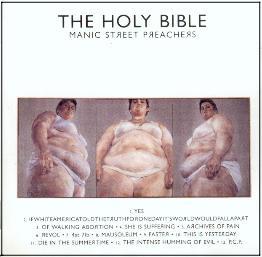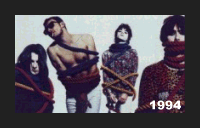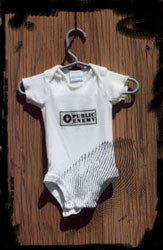|
The Holy Bible - According To Nicky
And Richey
[Nicky's responses are probably not as originally published!]
"Yes"
Nicky: It looks at the way that society views prostitutes as probably
the lowest form of life. But we feel that we've prostituted ourselves
over the last three or four years, and we think it's the same in every
walk of life. Marlene Dietrich said that she'd been photographed to
death. Red Indians believe that every time they're photographed, a piece
of their soul goes. We came to a point when we felt a bit like that.
I don't want to come across like Eddie Vedder or something, because
we've always made an effort to make our pictures fairly aesthetic. But
you just come to a point where you think, 'Why are we doing this?' It
must come with maturity.
There's a line in there: 'Tie his hair in bunches, f*** him, call him
Rita if you want'. You do get to a position when you're in a band where
you can virtually do anything you want, in any kind of sick, low form.
It's not something we've particularly indulged in, but it is a nasty
by-product of being in a group.
Richey: Prostitution of The Self. The majority of your time is spent
doing something you hate to get something you don't need. Everyone has
a price to buy themselves out of freedom.
"Ifwhiteamericatoldthetruthforonedayitsworldwouldfallapart"
Nicky: It's not a completely anti-American song. It compares British
imperialism to American consumerism.
It's just trying to explain the confusion I think most people feel about
how the most empty culture in the world can dominate in such a total
sense. I've got an ambivalent attitude to America. I can't tell whether
I should embrace it or just be confused by it. When we went to New York,
I'd watched 'Cagney & Lacey' so much that I felt like I knew New
York already when we got there.
The last lines (F*** the Brady Bill/If God made man they say/Sam Colt
made him equal) are about the gun laws that Clinton is trying to bring
in. It would disenfranchise the black community, who generally don't
have licences. The white rednecks in middle America do have licences,
but statistics show they cause as much crime.
Richey: America is still trying to convince itself it is positive,
enlightened and absolute. Zapruder the first to sow doubts behind the
reality/death of JFK. Bradey Bill typical - glorify gun culture until
The Massacre gradually moves from the inner cities to the suburbs. The
consequence arrives. Still believe Democrats are an alternative.

"Of Walking Abortion"
Nicky: There's a line: 'Horthy's corpse screened to a million'. Horthy
was a Hungarian fascist military dictator before the second World War,
and the devotion that a fascist dictator can achieve just shows such
a terrible flaw in human nature. There's always a chance that it'll
be revived, because there's a worm in human nature that makes us want
to be dominated.
Richey: East European truths - Horthy+Tisu (anti-Semitic/Fascist) -
revived and brought back home. Facts ignored. Carve your mortal certainty
there. Should we have been born/still born/walking sideways unable to
make a decision of any consequence. Modern life makes thought an embarrassment.
Your true reflection=Junkies, winos, whores. Who's responsible?
"She Is Suffering"
Nicky: It's quite a simple song, both musically and lyrically. It's
kind of like the Buddhist thing where you can only reach eternal peace
by shedding every desire in your body. I think the last line, 'Nature's
lukewarm pleasure', is Richey's view on sex. I can't really explain
it, but that's the way he sees it.
Richey: 'She' is desire. In other Bibles and Holy Books no truth is
possible until you empty yourself of desire. All commitment otherwise
is fake/lies/economic convenience.
"Archives Of Pain"
Nicky: That was the song that me and Richey worried about the most,
and did the most work on. It was written as a reaction to the glorification
of serial killers. In 'Silence Of The Lambs', Hannibal Lecter is made
into a hero in the last scene of the film-people feel sorry for them.
It's like that line from Therapy? 'Now I know how Jeffrey Dahmer feels'
('Trigger Inside - Troublegum). I don't f***ing want to know how Jeffrey
Dahmer feels, and I think it's quite appalling to put yourself in that
position. Everyone gets a self-destructive urge the urge to kill, but
I don't particularly like the glorification of it.
There's a book by Marcel Foucault with a chapter called 'Archives Of
Pain'. Richey and I did that book at university, and it had quite an
influence on us. It talks about the punishment matching the crime. But
the song isn't a right-wing statement, it's just against this fascination
with people who kill. A lot of people don't like to see rapists getting
off with a £25 fine.
That line: 'Kill Yeltsin, who's saying? - well, Yeltsin is a figure
of hate to us. A person who's basically an alcoholic... That's a personal,
petty Manics thing.
Richey: Bentham's 'Panopticon' - visibility is a trap.
Foucault - Savagery is necessary.
Is revenge justified? Nothing in common with Manson or Dahmer cult and
its current fashionability. There is no glory in innocent death. Death/Murder/Redemption
part of the human condition.

"Revol"
Nicky: All those lines like 'Breshnev married into group sex', are just
analogies, really. It's trying to say that relationships in politics,
and relationships in general, are failures. It's very much a Richey
lyric, and some of it's beyond my head. He's saying that all of these
revolutionary leaders were failures in relationships-probably because
all his relationships have failed!
Richey: All adolescent leaders of men FAILED. All love FAILS. If men
of the calibre of Lenin and Trotsky failed, then how can anyone expect
anything to change. Won't get fooled again.
"4st7lbs"
Nicky: Every word of that is Richey's, and it's pretty autobiographical.
I think that when he was admitted to hospital, he was down to about
six stones, which, for a five-foot-eight 25 year old, is pretty grim.
There's been a lot of media coverage of anorexia lately, and I think
for a lot of people it's like the final act of self-control. Nothing
can alter your course; you've got to keep control of what you're doing.
But of course it's like a slow death. Any association with self-abuse
and self-control is quite romantic in a naive sort of way, but obviously,
the reality of anorexia is much worse than the idea.
Richey: Vanity/innocence/anorexia - True or False.
Finding your own self worth and admiring yourself for it, whatever that
involves. Kate (Moss), Kristin (McMenamy), Emma (Balfour), Karen (Sky
Agony Aunt).

"Mausoleum"/"The Intense Humming Of Evil"
Nicky: These two can be twinned together, because they were both inspired
in the same way. Last year we visited Dachau, Belsen and the Peace Museum
in Hiroshima, and those three places had quite an intense influence
on us, and on the whole album. Dachau is such an evil, quiet place.
There's no grass, and you don't even see a worm, let alone any birds.
All you can hear is this humming of nothing. In the museum at Belsen,
there's the original sign which hung there. It says, 'Welcome to Belsen
Recreation Camp'. It's the same with the Peace Museum in Hiroshima.
When you're young, you're brought up to think that the Americans dropped
the bomb because they had to end the war, and loads of Americans would
have been killed otherwise. But when you go there and see the pictures
of the whole city completely flattened, and the black rain, and all
the people who died from the secondary effects...If anyone goes to those
places and doesn't feel an immense sense of loss, they've got no soul.
The lines: 'Churchill no different/Wished the workers bled to a machine'
are about how Britain always thinks that it has a superior attitude.
But as soon as the war was over, the attitude was: 'Let's get back to
normal and exploit as many people as we can again. Keep the proles happy,
tie them to their machines, and send them out to war again to be killed
when we need to'.
Richey: Brother/sister songs. Visited Dachau and Hiroshima. What reflections
should be for everyone. Otherwise we're all Edward Scissorhands Avon
Lady. Winners dictate history. Holocaust one of the few examples where
even truth is being questioned. Revisionist historians. Danger of Schindler's
List - Portrayal of merely flawed man. Never question our own past -
myth of Churchill.
"PCP"
Nicky: I think that's more than anything about the right to freedom
of speech, and freedom of the media. Once the state gets control of
that in a country, you know everything's f***ed. That's the one thing
that I think is really frightening about Political Correctness - the
eradication of words. It's just so Orwellian - destroying words, changing
dictionaries and changing the meaning of words. Obviously, PC as an
idea is inherently good. So is socialism and so is communism, and they
ended up being abused. A lot of PC followers take up the idea of being
liberal, but end up being quite the opposite.
Richey: Links PC+PCP+New Moral Certainty. Language aimed at the working
class. Condemns the very people it aims to save. Self-censorship wrong.
'Liviticus' used by homophobes to justify their hatred. To take one
sentence from the bible to justify views very PC.
Also PCP the Revolutionary Portuguese Communist.
"Faster"
Nicky: Frankly, a lot of it is all Richey again, and I was always completely
confused by it. But when he wrote it he told me it was about self-abuse.
The opening line is: 'I am an architect/They call me a butcher - and
of course, he's been carving into his arm and all that...I think it's
the most confusing song on the album. I added some stuff about the regurgitation
of twentieth century culture, and the way that everything's speeded
up to such an extent that nobody knows if they've got any meaning any
more. It's probably the first time that we've written a song and not
completely understood what we've written.
Richey: Strength through weakness. All morality sown in the soil of
the ruling caste. Self-abuse is anti-social, aggression still natural.
Society speeding up - finds worth is failure.

"This Is Yesterday"
Nicky: That's the simplest song, musically and lyrically, on the album.
It's about how people always look back to their youth and look on it
as a glorious period. No matter what walk of life you're in, you always
revert back to childhood and look at it as a beautiful time when, as
the song says, 'Someone, somewhere soon will take care of you'.
Richey: Why do anything when you can forget everything. Memory more
comforting than future.
"Die In The Summertime"
Nicky: Again, it's all Richey's, and there's lots of disturbing images:
'Scratch my leg with a rusty nail/Sadly it heals.../A tiny animal curled
into a quarter circle'. It was one of the first songs we wrote for the
album, and I found it pretty disturbing when Richey first showed it
to me. Now, of course, it's even more so, and I think this and '4st
7lbs' are pretty obviously about Richey's state of mind, which I didn't
quite realise at the time. Even if you're quite close to someone, you
always try to deny thoughts like that.
Richey: Condition of old age - youth always remembered fondly. OAP
wants to die with favourite memory month in mind. Adult memories tawdry,
of little value.

|





